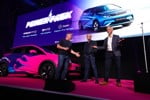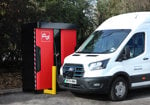Aggressive drivers take pleasure out of motoring
THERE are several issues I would like to mention under the same heading – bad and selfish driving.
There was a time when driving was a pure pleasure. There was courtesy on the road, not like it is now, with every man for himself.
Tailgaters are dangerous people and very selfish. They put the driver in front under undue pressure. They intimidate and cause the driver in front to spend too much time looking in his rear view mirror, wondering what the person behind will do next.
If, as the Highway Code tells us, you leave a safe space in front, you can be sure that someone will take the opportunity to fill it.
People constantly changing lanes in busy traffic don’t help, as this causes more congestion further back by making other drivers brake, instigating more unnecessary tailbacks.
The amount of time saved, assuming you actually arrive at your destination, can be minimal.
Then there are the motorbikes. These can be the most dangerous of all. We are told to look out for them and of course, this is good advice.
However, how many times do they suddenly appear from nowhere and overtake at an incredible speed? Even when a driver is travelling at the correct speed limit. Fleet drivers may be guilty of many of these things, or just a victim, but the point is that because of bad, selfish driving, avoidable stress is heaped on the shoulders of the driver.
Working for one of the largest ambulance trusts in the country, I see quite a lot of the consequences of such driving.
MALCOLM WILKINSON
Fleet administrator, East of England Ambulance Service, NHS Trust
We need to get parking message across
I AM the fleet manager for a company based in the south-east of England and have approximately 75 drivers, all driving contract-hired vehicles.
These drivers seem to show little concern for their vehicles and out of the 39 insurance claims we had last year, 30 of them were ‘hit while parked’. I noted the letter a few weeks ago ‘One way to cut the parking damage’ (Fleet News, September 28) and mentioned to my manager that we should do similar and investigate drivers who claim to have been hit while parked.
I met with the reaction that we could not generalise, name or shame our drivers due to the Data Protection Act. I was disheartened – we give these drivers our most expensive assets, let them do what they want and then accept the bill for the damage, a ludicrous situation.
I’m not suggesting that all drivers are to blame, but I believe it is worth the effort to try and reduce these numbers, even by one.
It’s getting the message across: how can you get management involved if they only see big numbers like rentals, fuel bills or rebates?
GWYNETH PLUMMER
By email
Lighting up
Lives must be the priority
I FOUND your article regarding lighting, ‘EC claims lighting up is good for you’ (Fleet News, October 19), interesting.
Your point about motorcyclists is an extremely valid one and nothing should be changed which may endanger more lives.
While Sweden may have this regulation in place, surely that is impacted by the amount of actual daylight the country has, or hasn’t as the case may be?
However, the use of lights when it isn’t that dark, when no street lights are on, can make visibility worse.
If you drive down a road with no cars on it in the early evening when it is still light enough not to have lights on, you can still see everything around you quite clearly, but once you meet a stream of traffic with their lights on it immediately makes the area seem a lot darker than it is, endangering all concerned.
Surely it would be far better to have some form of light detection system installed to avoid people forgetting to put lights on, or to ensure lights come on at the right time and avoid unnecessary use.
MANDY BENNETT
Facilities and administration supervisor, Hannover Services (UK)
Make vehicles more visible
COMPULSORY daytime sidelights reduce accidents because it ensures all cars are visible in twilight periods.
There are always a number of drivers who cannot get to grips with these progressively darkening mornings and do not put their lights on.
They even ignore the flashes of other drivers.
Making cars more visible would undoubtedly reduce the number of pedestrians accidentally stepping out in front of them and, despite slightly reducing pedestrian visibility, would reduce pedestrian accidents in total.
Motorcyclists tend to drive with full lights on, which would continue to make them conspicuous.
PAUL WHITTLE
By email
Government must fight EC proposals
HAVING read about the issue ‘EC claims lighting up is good for you’ (Fleet News, October 19), I think it is just another example of an unnecessary and dangerous move by the European Commission.
Stephen Ladyman is to be congratulated for fighting against it, but sounds pessimistic about winning. He and the government must stand firm on this issue with the support of the country.
As your article points out, motorcyclists would be at a distinct disadvantage. The emergency services also would not stand out as much if every vehicle had its lights on, leading to more accidents through emergency calls.
Vehicles travelling over speed bumps could appear as if the driver is signalling and could cause a serious accident. There would also be an increase in fuel consumption and emissions, additional legislative and administrative processes required and a reduction in the life of the bulbs that would be very costly if xenon bulbs are fitted.
What would happen to current cars? Would drivers have to switch on their lights or risk a fine from the police? What would constitute daytime running lights anyway?
Most drivers do not seem to appreciate how to use their existing sidelights and at dusk switch immediately to dipped beam, causing unwanted and dangerous distractions. We already have to suffer with idiot drivers with their car’s foglights on at all times.
This would be worse.
If on a clear, bright summer’s day with good conditions a driver can still manage to hit another vehicle then what hope is there that a couple of lightbulbs can prevent an accident?
The EC would be better standardising safety critical aspects such as driving tests, insurance requirements, MOT test, tyre tread depth and quality of maintenance and repairs.
ALAN BASHAM
Fleet administrator, Ellenor Foundation
Get a letter published in Fleet News and you will receive a fantastic 512Mb computer memory stick worth £15 courtesy of fleet software and occupational road safety specialist Jaama. The stick can be filled with your own documents, presentations and spreadsheets for easy movement between computers and locations.















Login to comment
Comments
No comments have been made yet.